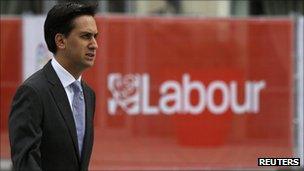Labour - small announcement, big idea
- Published

Ed Miliband wants the Labour party to help the nation's "squeezed middle"
Ed Miliband has launched his conference with a small announcement - his proposal to cap tuition fees at £6,000 - and a big idea - the need for a new political "settlement" to replace that which spanned the Thatcher, Major, Blair and Brown years.
Let me begin with fees. Labour have got exactly the headlines they wanted for what is not so much a new policy as a new symbol.
The party leader rather curiously would not say whether this new tuition fee limit would make it into his election manifesto since the party's policy review has yet to find an affordable way to scrap fees and replace them with a graduate tax - the idea the two Eds advocated when they stood for the leadership.
What today's announcement - along with others on train fares and energy bills - was really about was signalling that Labour is in favour of helping the "squeezed middle" and is willing to stand up to vested interests whether banks, energy or rail companies.
A harsher headline today could have read - "Miliband U-turn - Labour backs doubling fees".
So, let's turn to the big idea which will, I'm told, be the focus of Ed Miliband's speech on Tuesday. He will spell out - along the lines of his Observer interview today, external - that he sees the current economic crisis as a failure of free market capitalism over three decades and not just the months since the Coalition was created or the three years since the banking crisis.
Political shift
The old "settlement" began when Margaret Thatcher was prime minister and Labour in government was, he believes, too scared to touch it.
His friend, adviser and speech writer, Lord Wood, claimed in the New Statesman, external that we are "witnessing the death-throes of the ideology of neoliberalism that has dominated Britain for over 30 years (and which) was based on a belief that deregulated markets, less government, and reducing taxes on the well-off (to reward effort and to enable the fruits of success to trickle-down to the rest of the country) would bring national renaissance."
What this could mean, in theory, is a government that proudly raises taxes on the rich - instead of apologetically saying that there is a temporary need for a 50p rate; higher taxes and more regulation on the banks; an active industrial policy inspired not by the attempt to "pick winners" in the 70s but the interventionism of successive French governments; government paying its staff and encouraging its contractors to pay a "Living Wage" - higher than the Minimum Wage; and labour market regulation to make it harder for cheap immigrant labour to undercut those already living here.
If he means what he says, it is more than mere rhetorical cover for populist banker bashing, if he goes on to add policy substance it would, indeed, be a profound shift in politics.
So far, the left has suffered rather than benefited from the crisis in free market capitalism. Ed Miliband believes that is about to change. This week we will get a first sense of whether he might just be right.